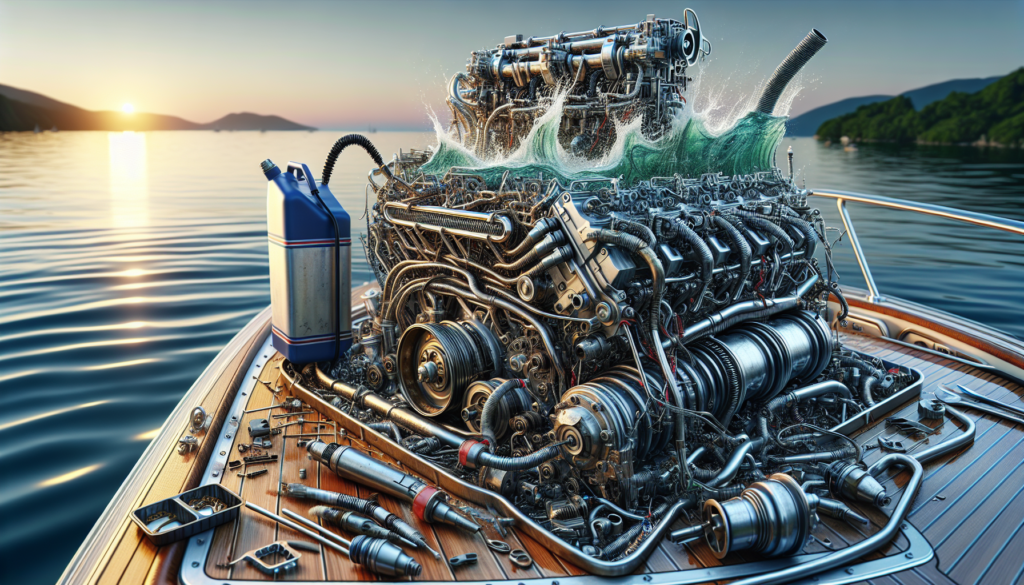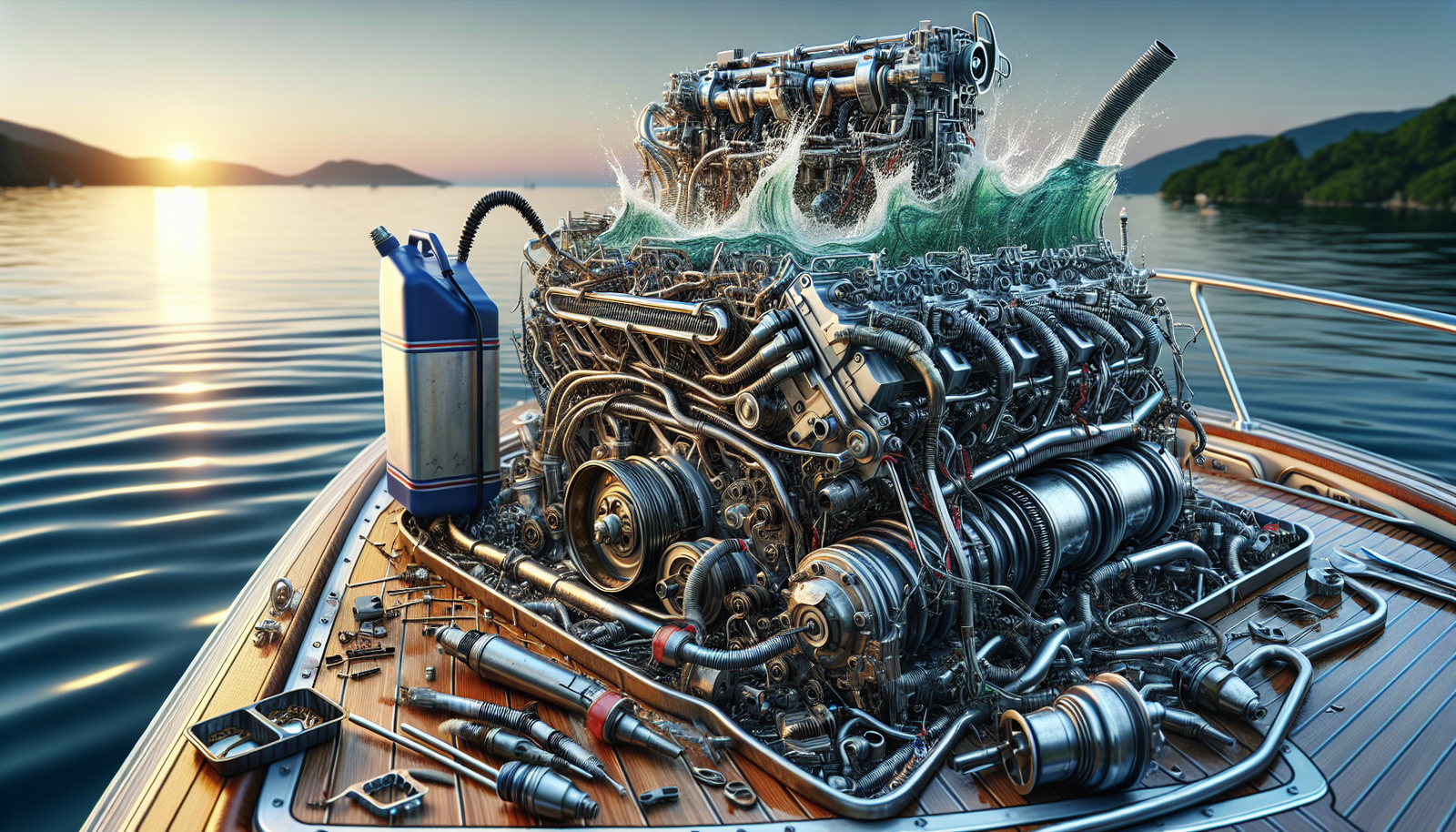Imagine setting off on a brisk morning, the sun gleaming off the water, eager for a day of boating, only to find out that your boat engine is behaving peculiarly and losing power. Your once mighty engine now splutters and groans, refusing to work as efficiently as it once did. You may be baffled and frustrated, asking yourself, why is my boat engine losing power? While it may seem like a complex issue, understanding the reasons behind engine power loss and what to do about it can save your day on the water and even your boat engine. This article will explain the potential causes of your boat engine’s power loss, providing practical advice and solutions to restore your vessel to its former glory.

Understanding the Basics of Boat Engine Power Loss
Navigating the open water requires a reliable boat engine with optimal power. So, tackling engine issues that may lead to power loss is crucial. Understanding the fundamentals of potential engine power loss will empower you to identify the problem and decide whether you can address it yourself or should seek professional help.
The importance of engine power in a boat
Engine power is the lifeblood of your boat, determining its speed, stability, and overall performance. Power dictates how efficiently your boat can travel and maneuver, directly influencing your boating experience. A loss in power can reduce your control over the boat, endangering your safety and that of your passengers.
Defining power loss in boat engines
Power loss in boat engines usually refers to a situation when the engine doesn’t generate as much power as it’s designed to or as it used to. This can result in slower boat speeds, reduced fuel efficiency, and overall disjointed and uncomfortable sailing experience.
Basic indications of a power loss issue
Your boat may be dealing with power loss if you notice decreased top speed or slower acceleration. Unusual noises from the engine, increased fuel consumption, and difficulty starting the engine could also indicate power problems. Maintain a keen eye and ear for these signs to address the issue promptly.
The Role of Fuel in Engine Power Loss
Fuel plays a significant role in engine power. Understanding its purpose can help you identify loss of power linked to issues with fuel quality or supply.
Understanding the functions of fuel in a boat engine
Fuel is the primary source of energy for your boat engine. By combusting in the cylinders, it creates a force that propels your boat. Consequently, any issues with the fuel could directly impact your engine’s power.
Issues with the quality or supply of fuel
Poor fuel quality or interrupted supply can limit the efficiency of the combustion process, leading to power loss. This could be due to contaminated fuel or blockages in the fuel lines and filters, preventing fuel from reaching the engine.
Why fuel contamination can cause power loss
Fuel contamination is a common cause of power loss in boat engines. Contaminants, like water or dirt, can disrupt the combustion process, decreasing engine power. Ensure you store and handle your fuel properly to minimize the risk of contamination.
Impact of Air Supply on Engine Power Loss
Air supply is another important element in the efficient functioning of a boat engine. Understanding its role can help you tackle any power loss related to it.
Role of air supply in engine functioning
Air supplies the necessary oxygen required for the fuel combustion process in the engine. An optimal mix of fuel and air is essential for efficient combustion, and thereby, maximum output from your engine.
How air leakages can cause engine power loss
When there’s a leak or obstruction in the air intake system, the engine can’t get the required air, leading to deficient combustion and power loss. Uncovered air filters, cracked intake manifolds, or loose and damaged hoses are potential sources of air leakage.
Addressing issues related to air supply
Regular checks for signs of damaged or loose parts in the air intake system can help prevent air supply issues. Getting a comprehensive engine check-up and cleaning or replacing air filters periodically can maintain a steady air supply, preventing engine power loss.

Influence of Ignition System on Engine Power Loss
The boat engine’s ignition system is critical for power generation. It helps combust the fuel-air mix, creating power. Any problem in this system can lead to engine power loss.
Basics of a boat engine’s ignition system
The ignition system creates a spark, initiating the combustion process in the engine. It comprises various components including spark plugs, ignition coils, and the distributor.
Common ignition problems leading to power loss
Issues such as worn spark plugs, damaged ignition coils, or faulty distributor cap can cause inconsistent ignition, affecting the boat engine’s power. A weakened spark might fail to ignite the fuel-air mixture completely, leading to decrease power.
Prevention and maintenance tips for the ignition system
Regular inspection and timely replacement of the ignition system components help maintain its functionality and prevent power loss. Make sure the spark plugs are clean and free of carbon deposits, the distributor cap is intact, and ignition coils are in good condition.
The Importance of Routine Engine Maintenance
Regular maintenance of your boat engine is essential to keep it running smoothly and avoid power loss. It helps in identifying potential problems early and addressing them before they escalate.
The link between engine maintenance and power output
Routine engine maintenance ensures all engine components are working optimally, leading to efficient combustion and maximum power output. Neglecting maintenance might slowly degrade the engine parts, causing power decline.
Common maintenance negligence causing engine power loss
Negligence such as irregular oil changes, not cleaning air filters, and ignoring minor repairs can lead to significant power loss. For instance, overdue oil changes can lead to the build-up of sludge and contaminants that compromise engine efficiency and power.
Routine maintenance checklist to prevent power loss
Regardless of how often you use your boat, schedule regular engine inspections. Replace oils and filters timely, keep the fuel system clean, and check components like ignition system, air intake system, and cooling system. Regular diagnostics will help prevent unexpected power loss.
Key Electrical Aspects That Can Cause Power Loss
The electrical system, though often overlooked, plays a pivotal role in the smooth running of a boat engine.
Understanding boat engine’s electrical system
The electrical system in your boat engine includes the battery, alternator, and sensors among others. They not only ignite the engine but also power other systems in the engine that contribute to its power output.
Electrical issues leading to engine power loss
Adequate charge supply is crucial for the ignition system to work effectively. A weak battery or problematic alternator can cause inefficient ignition, leading to reduced engine power. Similarly, electrical wiring issues or faulty sensors can affect various engine functions and cause power loss.
Effective ways to maintain electrical system
Keep your electrical systems in check to prevent power loss. Keep an eye on your battery health, ensure the alternator is working properly and regularly inspect the wiring for any damages. A well-maintained electrical system can enhance overall engine performance and power.
Problems with Cooling System Leading to Power Loss
The cooling system plays a vital role in maintaining optimum engine temperatures and thus, maximising power output. Problems within the cooling system can cause engine power loss.
How cooling system works in boat engines
The cooling system in your boat engine circulates coolant to absorb and dissipate the heat generated by the engine. Without an efficient cooling system, your engine may run too hot, affecting its performance and causing power loss.
Issues with cooling system causing power loss
If the cooling system fails, the engine overheats, risking significant engine damage and power loss. This failure could result from a damaged water pump, clogged coolant lines, or a leaking radiator.
Maintenance tips for cooling system
Monitor the cooling system regularly. Check coolant levels, inspect for leaks or damages in the radiator, water pump, and lines. Periodic flushing and refilling of coolant can maintain the efficiency of the cooling system and protect your engine from power loss.
Significance of Propellers in Engine Power
Propellers play an integral role in the propulsion of your boat. They also have a significant influence on the power of the engine.
How propellers contribute to boat’s engine power
When you rev up your boat’s engine, propellers spin in the water, creating a backward motion that pushes your boat forward. Therefore, a well-functioning propeller can maximise your engine speed and power.
Damaged or inefficient propellers effect on engine’s power
Damaged or inefficient propellers can increase drag, forcing your engine to work harder and consume more fuel. This could decrease the engine’s power and your boat’s speed.
Need for regular propeller checks and replacement
Ensure that your propellers are free from cracks, bends, or corrosion. Regular checks and prompt repairs or replacements can keep your propellers in optimal condition and prevent power loss.
Engine Overheating Leading to Power Loss
Engine overheating, if ignored, can cause serious power loss. Knowing how it happens and its impact on power can prevent significant damage.
Understanding engine overheating
Engine overheating occurs when excessive heat build-up within the engine isn’t effectively dissipated, pushing engine temperatures beyond the optimal range.
How overheating causes engine power loss
Overheating can cause severe damage to engine parts, reducing their efficiency and subsequently causing power loss. Ignoring it can lead to engine failure.
Preventing overheating issues in boat engines
Keep a close eye on temperature gauges. Ensure coolant levels are replenished regularly, ventilate engine compartments appropriately, and maintain the health of the cooling system. Annual inspections by a professional for signs of damage or wear can also prevent overheating.
Professional Assistance for Engine Power Loss
When it comes to complex engine issues, seeking professional help can often be the wisest course of action.
When to seek professional help
If you’ve evaluated all possible causes and can’t identify the power loss source, it’s time to seek professional help. Regular power loss, despite your efforts, is another valid reason to consult a professional.
What to expect from a professional engine check-up
A professional engine check-up typically involves a thorough examination of all contributing factors to engine power loss – from fuel and air supply checks to reviewing electrical and cooling systems, the ignition system, and the propellers.
Importance of relying on professionals for complex issues
Professionals have specialized knowledge and expertise to diagnose and rectify complex engine issues, potentially saving you from severe damage and expenses. If you’re unsure or unequipped to deal with the power loss issue, it’s best to leave it to the professionals.
By understanding the basics of how a boat engine works and the potential reasons leading to power loss, you can stay on top of maintenance tasks, troubleshoot minor problems, and identify when it’s time to take your boat to the professionals. Keep in mind that prevention is always better than cure.

